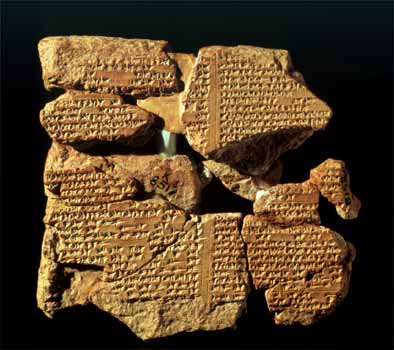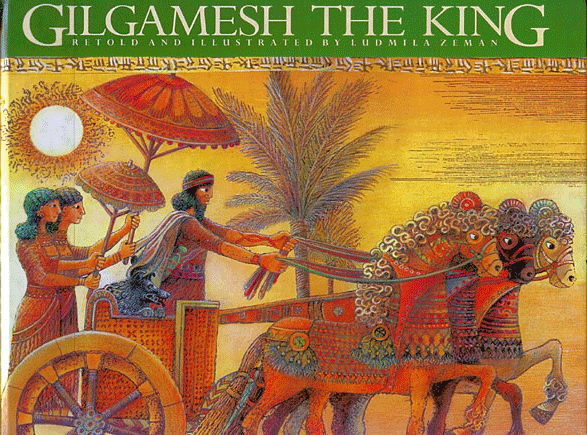THEAMES
While reading the “Epic of Gilgamesh” I have found several themes that match other mythical stories of Creation, such as Love, Friendship, Loyalty, Strength, Death, and Immortality, all of which are important concepts that develop throughout this fascinating story. In the story, first off, the theme of “love” shows up. Shamhat (who is a harlot) offers herself sexually to Enkidu in order to contract his innocence and strength. After spending seven days with Shamhat, Enkidu changes from a “wild man” into an ordinary human. Love, loyalty and friendship with Enkidu cause great changes in Gilgamesh as well. At the beginning of the story, as a king, Gilgamesh appears very powerful and oppressive, who cares for no one but himself. Then, after Enkidu interferes with his life, this changes his personality: from a brutal tyrannical ruler into an even greater and more heroically compassionate leader.
The love and loyalty that the two friends have for each other makes Gilgamesh a better person in the first half of the epic, however, it becomes the beginning of his suffrage at the same time. After Gilgamesh kills the Guardian of the Cedar Forest, Humbaba the Terrible, and then builds a great cedar gate for the city of Uruk, he becomes more famous, and the goddess Ishtar gets sexually attracted by him. However, Gilgamesh refused goddess Ishtar’s love, which makes her upset, and she sends the Bull of Heaven to destroy Uruk. As we see, erotic love becomes a reason of distraction. Friendship has very important role in this epic. The bond between Enkidu and Gilgamesh makes friendship a necessity for achievements. Because they are evenly matched, Enkidu and Gilgamesh fulfill each other. They are always working together, encouraging one another, and are very supportive of each other. Gilgamesh’s connection to Enkidu makes it possible to fight and win the great demon, powerful Humbaba and the Bull of Heaven. But when Enkidu dies and Gilgamesh fills the loneliness he goes into depression. Enkidu’s loss makes him think that life is pointless if there is death, and the sorrow and terror of death drive him into a mission of finding immortality. Gilgamesh’s strength and power gave him so much confidence that he even went to fight Humbaba the Terrible, who is known as a powerful demon of the Cedar Forest. And after he wins, he fights the Bull of Heaven.
Together with his friend, who also was strong, they didn’t have any fear what so ever. Even though they both were strong, they also had weaknesses. One of the most significant weaknesses was the death. None of them could prevent death. After Enkidu’s death only Gilgamesh realized his weakness. And horrified by that idea Gilgamesh gathered all his strengths and goes on a journey to find immortality. Another weakness that is noticeable in the epic is when he fails achieving immortality twice. First he fells in sleep, while he should be strong and stay awake for 6 days, then the plant, which he gets out of the sea is being eaten by a snake.
Death and immortality are the main themes in the epic. Through Enkidu’s death for the first time Gilgamesh starts questioning the meaning of life. Gilgamesh becomes very worried after he realizes that everyone is going to die eventually. But he denies the fact that he is mortal and he will die as everyone else. Even though he was two-thirds god and one-third human, he wasn’t immortal like gods. He finds the life meaningless if there is no immortality. And terrified of the truth he tries to find immortality. He starts his journey of finding Utnapishtim and his wife, who were the only immortal human beings on the earth. But after the harsh journey, he fails achieving immortality. And he realizes that immortality is unachievable, and death is inevitable.
STRUCTURE
The Epic of Gilgamesh has two parts. The fist part concentrates on Gilgamesh, who is described as a hero and the greatest king on earth, partly divine and a super-human. As handsome and powerful king of Uruk, he carelessly takes advantage of his position and does what he wants. And when people ask for help from god Anu, he creates Enkidu, who ends up being the best friend of Gilgamesh. Their devoted friendship becomes positive for both Gilgamesh and Enkidu. We see how Enkidu changes from a wild man into a noble one because of Gilgamesh, and their friendship changes Gilgamesh from a harsh oppressor into an ideal king and hero. The second part illustrates death of Enkidu, depression and loneliness of Gilgamesh, disappointment of life, denial of death, and the frailer of finding immortality. However, end of the story shows how Gilgamesh overcomes these obstacles after the long journey and sufferings; he accepts mortality and death, then he rebuilds Uruk to make it a powerful land and a strong city.
THE NATURE OF THE HEROIC
When Gilgamesh and Enriku went to kill Humbaba, first they wanted some adventure, because they got tired of staying in the city and doing nothing. Killing Humbaba would fulfill Gilgamesh’s selfish goal, to cut the tallest cedar trees and bring them to Uruk to build a great cedar gate for his city. Humbaba was no threat to Uruk; therefore, his death brings no benefits to people of Uruk. It was an unnecessary death; instead it caused Endiku’s death. The great heroic actions, first killing the demon Humbaba and second killing the Bull of Heaven, bacame a reason of Enkidu’s death, and Gilgamesh’s depression. As a superhuman, Gilgamesh was two-third god and one-third human, a powerful and fearless king, confident of his strengths. He was considered the greasiest king on the Earth; however, as powerful as he was, he couldn’t save his friend’s life. Then he realized that he is mortal too, and he will die as everyone else. And after his journey to Urnapishtim and gaining the knowledge of the flood and immortality, he devotes the rest of his life to his city and the traditional life of Uruk, building and making his city more powerful. The most important is that eventually Gilgamesh overcomes the obstacles of his sufferings and accepts the life as it is, and builds his city to be a powerful land for his people.
THE GODS
The Gods in The Epic of Gilgamesh were actively involved in human lives. People called for Gods help, when they were in danger. And right at the beginning of the epic, we see how they asked Gods to help them to control Gilgamesh, when he was brutally taking advantage of his position towards Uruk’s citizens. Then we see how Shamash helps Gilgamesh and Enkidu in the bottle with Humbaba, and how Gods get mad at Gilgamesh and Enkidu for killing Humbaba and The Bull of Heaven and punish Enkidu with sickness and death. Creating the flood to destroy human lives and to wipe out all of humanity from the Earth, also shows how gods can be involve in human lives and do what fits them better. And this clearly shows that the Gods don’t value human life. When Gilgamesh rejects Ishtar’s offer, to be his lover, and insults her, she punishes him for his bad manners. Gilgamesh ends up paying very high price for his bad behavior.

It’s interesting to notice that unlike other mythologies, there was less fear towards Gods, and there was no patriarch or matriarch, and they weren’t as organized as in Greek and Roman Gods. Moreover, with their super strength and power gods also have great emotions like humans.
THE FLOOD
The flood myths are common to practically every culture on the earth; however, they differ significantly in details. Each version of the flood has very different emphases and depicts a different moral. The Epic of Gilgamesh is the earliest version, the original story that all other flood stories descend from. Flood is a widespread theme among many religions which shows that gods are great and they can wipe out the civilizations, the humanity to start over again if they wish so.
There is a parallel between Utnapishtim in the Epic of Gilgamesh, the Hindu Puranic story of Manu, Deucalion in Greek mythology, etc. But the best known of all is the biblical account of Noah’s Ark. All the flood stories show how a flood was sent by deity/deities to destroy humanity as an act of divine retribution. Although in Genesis the flood was created to destroy humans because they became brutal (“…the earth was corrupt in the face of God, and the earth was full of violence” Genesis 6), but in the Epic of Gilgamesh there is no actual reasoning.

After all, the whole epic is about Gilgamesh, a king of Uruk, who is set out on a quest for knowledge and immortality. By realizing that as a human he will never be one with Gods, he finds a great balance in life, and becomes a great king for his people. He understands, that after all only matters what you will leave behind before you die. The epic gives us a great understanding that the most important in life is who you are, who do you live your life and how much importance to you give for each day that you live.
